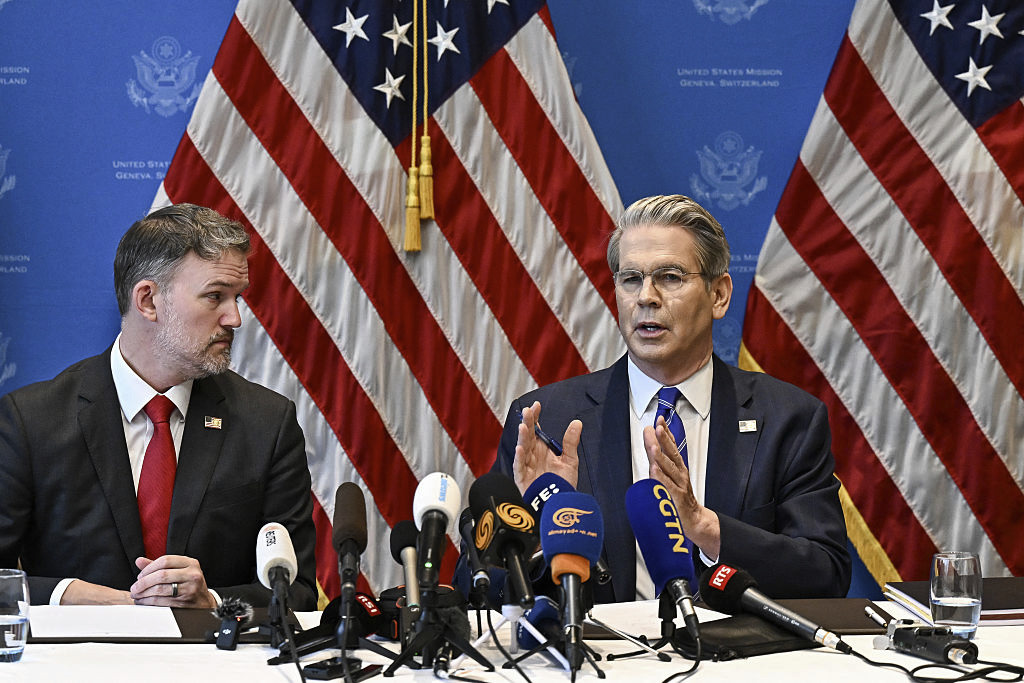
On May 12, President Donald Trump announced a "total reset with China."
"The best part of the deal," he said, was that "China agreed to open itself up to American business." Beijing, Trump proclaimed, will "suspend and remove all of its non-monetary barriers."
In the meantime, both the U.S. and China agreed to drop tariffs by 115 percentage points. The general American tariff rate on China's goods is now 30%. The general Chinese rate is 10%. Both reductions will be in effect for 90 days.
China also agreed to reverse "all the non-tariff countermeasures taken against the United States since April 2, 2025."
American tariffs in place before April 2, such as the Section 232 and Section 301 levies, remain in effect.
These moves, in sum, undo American and Chinese measures that were put in place from April 2, what Trump has called "Liberation Day."
The White House termed the arrangement "a historic trade win for the United States."
No, the arrangement is a win for China.
The assorted U.S. tariffs are generally remedies for China's theft of U.S. intellectual property and its increasingly predatory trade practices. For the period of the pause, China will undoubtedly continue unacceptable practices without facing the penalty of the elevated tariffs.
The elevated tariffs, if left in place, would keep most Chinese goods out of the U.S. The main barrier to American goods in China, however, is not Chinese tariffs but China's many non-tariff barriers, which are untouched by the new deal. Therefore, the tariff rollbacks benefit Chinese exporters far more than America's.
The relief for China came at a crucial time. The 90-day pause covers the beginning of the Christmas season for China's export factories.
In short, Trump effectively traded tangible relief from American tariffs for China's vague promise to open up its economy.
The Chinese promise is unlikely to be worth anything. The only way China's President Xi Jinping can honor his pledge is to give up most elements of communism, because non-tariff barriers, predatory trade practices, and even theft are inherent in that system.
Xi will not relent because he has long believed in total state control and now is preparing for war. Therefore, he is trying to make China even more self-sufficient than it has been during the four-decade "reform era." That means he will not allow American business to have even more sway in China.
"The new U.S.-China trade deal shows that President Trump blinked," trade expert Alan Tonelson told Gatestone. "Even though the mutual tariff rollbacks are set to last only three months, Trump's actions restore a pre-Liberation Day status quo that he rightly has deemed unacceptable. In return, he received nothing of consequence."
Why did Trump agree to such an unfavorable arrangement?
The dominant narrative is that the president gave in to the fear of both bare shelves in big-box stores and of skyrocketing prices.
Reporting tells us White House advisors were worried about eroding political support, but a better explanation is that Trump was giving Xi, heading to a collision with a world unwilling to accept a new flood of Chinese goods, a final off-ramp.
Moreover, Trump was worried about the devastating effect of his tariffs on China. "We're not looking to hurt China," he said on May 12. That country, Trump noted, was "being hurt very badly." "They were closing up factories," he pointed out. "They were having a lot of unrest."
"Given the Chinese economy's mounting woes, the tariff reprieve granted by Trump is especially ill-timed," said Tonelson, who blogs on geopolitics and trade at RealityChek. "If the President is not willing to keep or increase the trade pressure on China now, when will he use the decisive leverage America enjoys as a crucial export market for the Chinese?"
"Trump's tariffs hit Xi and the Communist Party at the worst possible time for the regime," Blaine Holt, a retired U.S. Air Force brigadier general who has participated in numerous Sino-U.S. Track II dialogues and lectured at Chinese universities and think tanks, told Gatestone. "They were already at the 'End of Dynasty' moment. The tariffs were the final end."
Despite everything, Trump is still hoping for robust relations with the Communist Party, but unfortunately that is not possible. In addition to the inherent hostility of the regime to the United States, Xi for about a half decade has told the Chinese that their nation has already surpassed the U.S. and that America is in terminal decline.
Xi's favorite phrase, which highlights this bold view, is "new era." "Change is coming that hasn't happened in 100 years," he said in March 2022 to Vladimir Putin while bidding farewell after their 40th in-person meeting. "And we are driving this change together."
Xi cannot now admit that China needs the United States, and he certainly cannot be seen as giving in to American coercion. In fact, the Chinese regime since the tariff announcement has been crowing about its win over Trump.
Americans should not try to foster cooperation with a militant leader. Instead, they need to build resilience into supply chains.
Companies, however, will view Trump's pause in tariffs as a signal, a dog whistle that it is okay to keep factories in China.
Americans, however, should be trying to move factories out of China, because they can no longer rely on that hostile state to deliver the products they need. On May 12, Treasury Secretary Scott Bessent, speaking to CNBC's "Squawk Box," urged a "decoupling for strategic necessities."
Yes. And "a complete decoupling," which as Trump tweeted in 2020, would remain "a policy option," would be even better. Why should Americans shovel any cash to Communist Party's coffers?
When Trump forces all factories to move out of China and locate either to America or countries both friendly and nearby, Americans can truly celebrate "Liberation Day."
Gordon G. Chang is the author of Plan Red: China's Project to Destroy America, a Gatestone Institute distinguished senior fellow, and a member of its Advisory Board.


